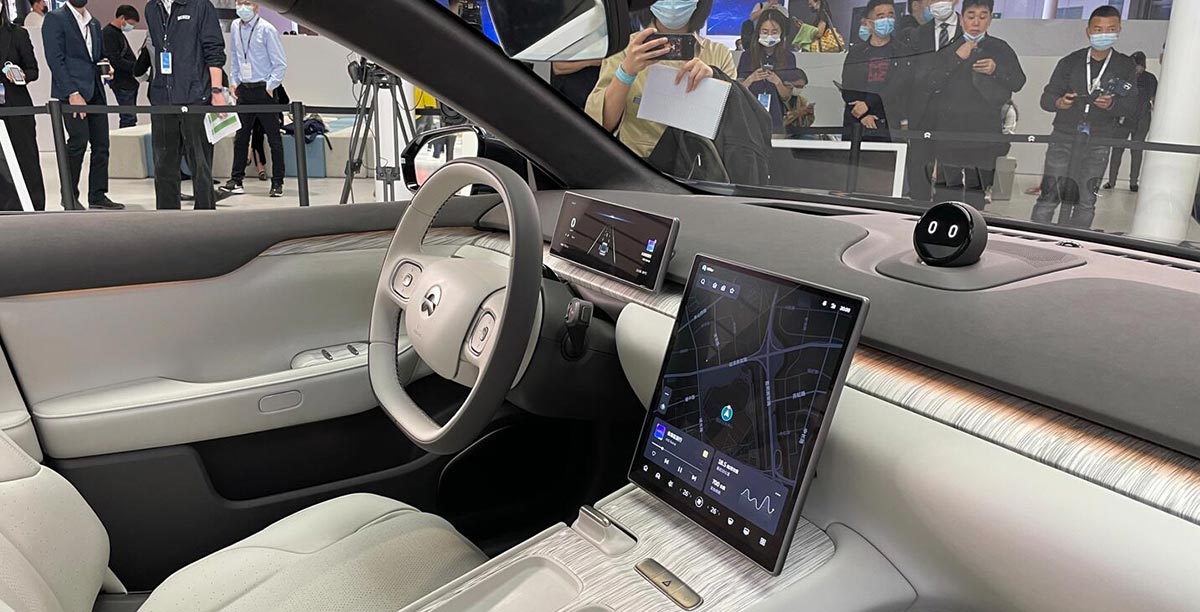Nio's in-house developed first-generation chips will be based on the 7 nm process and include a smart cockpit chip, an autonomous driving chip, and other chips including a CMOS image sensor chip, according to local media.
(Image credit: CnEVPost)
Nio (NYSE: NIO) has spoken publicly about developing its own chips but has revealed few details so far. Now, a new report offers more information.
Nio's first chip will be a 7 nm process-based smart-cockpit-oriented one, local automotive media outlet HiEV said in a report today.
The chip will be manufactured by Samsung, and the team's head of R&D is from Huawei's chip design arm HiSilicon, according to the report.
Nio has chip developers in Shanghai, Hefei, Beijing, and Shenzhen, with members of the team coming from companies including HiSilicon, MediaTek, and handset maker Oppo's Zeku business, which was dissolved earlier this year, according to the report.
Nio's vice president for hardware business, Bai Jian, is responsible for the overall planning and coordination of the chip business, with the head of R&D coming from HiSilicon, according to the report.
It's worth noting that Nio has mainly emphasized in previous external communications that the company is developing an autonomous driving (AD) chip, with little mention of cockpit chips.
On November 10, 2022, William Li, Nio's founder, chairman, and CEO, said in a call following the company's third-quarter earnings announcement that Nio has been actively developing an AD chip since 2021, and that the team reached 500 people.
Defining the chip in terms of algorithms will be much more efficient and will help boost gross margins, Li said on the call.
On August 15, Bai said on Weibo that some of the key chips that Nio has been developing in-house, including an AD chip, will be mass-produced in the next one to two years.
The first generation of Nio's in-house developed chips will be based on the 7 nm process and include a smart cockpit chip, an autonomous driving chip, and other chips including a CMOS image sensor chip, according to the report by HiEV today.
In addition to the 7 nm chip, Nio is also preparing for the development of a 5 nm chip, according to the report.
Nio's chip team, which has more than 100 people in Shanghai, is mainly working on 7 nm cockpit and AD chips, while the Hefei team is more tasked with 5 nm chip development, the report said, citing a person familiar with the matter.
Nio's first chip will be aimed at the smart cockpit, based on an Arm architecture that integrates more than 500 billion transistors, the person said.
The company's first cockpit chip has yet to tape out, and the electric vehicle (EV) maker is in talks with Samsung on the matter, according to the report.
Nio could see two chip tape out next year, based on 7 nm and 5 nm, HiEV cited the person as saying.
The tape-out of a chip based on a 7 nm process will cost roughly $30 million, and roughly $500 million for a 5-nm chip, the person said, adding that Nio will need to prepare sufficient funds for this.
With the rapid development of the smart EV industry, the demand for cockpit chips as well as AD chips has exploded.
China's mainstream flagship EV models get their cockpit chips from Qualcomm, currently mainly the Snapdragon 8155, and they choose Nvidia for their AD chips, mainly Orin X. For example, Nio's models based on the latest NT 2.0 platform are equipped with four Orin X chips.
Nio's in-house developed smart cockpit chip, if successfully mass-produced, is expected to make its debut in a sub-brand Alps model to be launched in the second half of next year, and would be one of the few models in the RMB 200,000 ($27,500) to RMB 300,000 price range to come with a non-Qualcomm cockpit chip, HiEV's report said.
Alps' model development is well underway, with the first pilot test car off the line and a second model already in development, Li said in an August 29 earnings call.
Alps appears to be using products from local suppliers for its AD chips.
In May 2022, HiEV reported that Nio was then evaluating the feasibility of using the Journey 5 chip from local chipmaker Horizon Robotics. Nio's local counterpart Li Auto (NASDAQ: LI) currently uses Journey 5 chips in some of its models.
In November 2022, Horizon Robotics CEO Yu Kai said in a speech that the company had entered into a partnership with Nio that would see one of the latter's new brand models use its products.
On why Nio is developing its own chips, Li explained last November when the company celebrated its eighth anniversary.
If Nio wants to achieve a 20 percent gross margin in the mass market, it has to make its own batteries and chips, otherwise, there's no chance of achieving that goal, Li said at the time.
If Nio can reduce the number of MCUs (microcontroller units) it uses in its models, it will not only address fluctuations in chip supply, but also save money, Li said.
($1 = RMB 7.2749)

